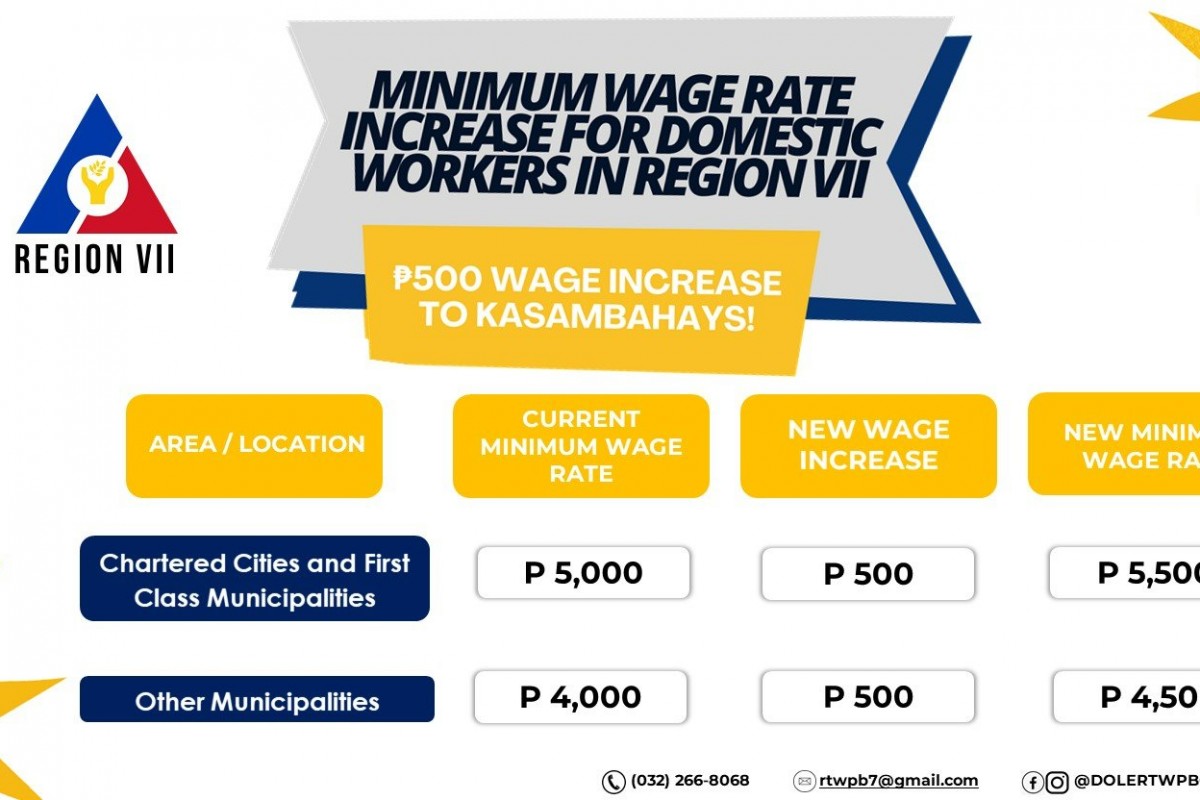CEBU CITY, Cebu, July 4 (PIA) -- The Department of Labor and Employment (DOLE) Region 7 is urging all employers to comply with the new minimum wage rates applicable in Central Visayas.
According to DOLE7 Regional Labor Information Officer III Luchel Senarlo-Taniza, Wage Order No. ROVII-23 for Private Workers and Wage Order No. ROVII-D.W. No. 03 for Domestic Workers became effective and enforceable on June 14.
Undersecretary and DOLE-7 Concurrent Regional Director Victor Del Rosario said it is imperative for both employers and workers that they become fully aware of their rights and responsibilities under the new wage orders.
“We are enjoining all employers to abide by the labor laws particularly on the new wage rates applicable in Central Visayas. Workers and employers’ organizations can also help disseminate information on minimum wages to their members and provide related advice and support," del Rosario said.
Under Wage Order No. ROVII-23, private workers, workers in the Non-Agriculture classification specifically those in the Class A cities and municipalities or the Expanded Metro Cebu area, will receive a daily wage of P435.
For those in Class B Cities and municipalities, the daily wage rate is P397, and the minimum earners in Class C municipalities will receive P387 as daily wage.
In the Agriculture and Non-Agriculture with less than 10 workers classifications working in areas under Class A cities and municipalities will be paid P425 daily.
Those in Class B areas shall receive P392 while those working in Class C localities will get P382 daily wage.
Wage Order No. ROVII-D.W.03 for domestic workers that also took effect on June 14 provides an additional P500 increase in their existing monthly wage.
Kasambahays working in Chartered Cities and First Class municipalities will be paid P5,500 monthly, while for those working in other municipalities, they will be receiving a monthly pay of P4,500.
“We want to empower workers to claim their rights. In the same way, we want the employers to also fully grasp the application of the new minimum wage rates and the computations needed should there be any wage distortions emerging in the workplace. That is why, a heightened awareness on this development is highly essential,” said del Rosario.
He encouraged workers and employers to connect with the Regional Tripartite Wages and Productivity Board (RTWPB-7) for clarifications on the new wage orders.
“With the RTWPB being a tripartite body, a participative process of minimum wage fixing was ensured allowing the minimum wage to be set at a level agreed to by workers and employers’ representatives. This has given the new minimum rates more legitimacy and with that, we are fervently hoping for our social partners to also help facilitate compliance,” del Rosario said.
DOLE7 will continue conducting inspections as a way of checking the compliance of establishments.
“Let us remember that high rates of non-compliance have negative consequences not only for workers and their families, whose rights are violated, but also for compliant employers, as it gives non-compliant enterprises an illegitimate cost advantage,” he added.
Workers who are paid below the set minimum wage rates may report to and visit the nearest DOLE office in their area. (JSME/PIA7 with reports from DOLE7)




